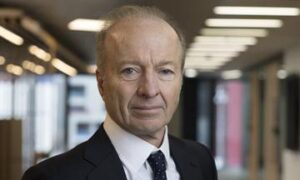

Blockchain can create a much more efficient operating model for asset managers and will be a game changer for private markets according to Duncan Moir, senior investment manager on the alternatives team at UK fund manager abrdn.
Moir is also responsible for the development of abrdn’s digital asset strategy and told Markets Media that the asset manager did not set up a separate digital assets team.
He told Markets Media: “Blockchain has become part of everyone’s job across the business, just like using Excel, and staff have upskilled.”
In August 2022 abrdn invested in Archax, the UK’s first regulated digital securities exchange which was set up to provide access for institutional investors to blockchain-based digital assets. Archax was approved by the UK Financial Conduct Authority for trading, custody and brokerage.
Stephen Bird, chief executive of abrdn said at the time that blockchain technologies would inevitably form a big part of the future of financial markets, with the potential to offer greater transparency, greater speed and less trading friction.
“With Archax, we will have a meaningful footprint in this fast-developing market – which is likely to evolve in a multitude of different ways that are relevant to our core businesses,” added Bird.
Moir agreed that fund operating models are dated and complex, creating significant costs and friction.
“Removing even five basis points of expenses results in huge savings and blockchain can create a much more efficient operating model,” said Moir.
In June this year Archax created a tokenized representation of its interests in the Aberdeen Standard Liquidity Fund (Lux) – Sterling Fund, abrdn’s flagship multi-billion money market fund.
Graham Rodford, chief executive and co-founder of Archax, said in a statement: “Creating a token representation of our interest in such a traditional and institutional-grade vehicle opens up all sorts of interesting opportunities in the digital asset space. We are exploring other applications with abrdn to improve access to investment products in this space in the near future.”
In August this year Archax was approved to distribute certain abrdn funds based out of Luxembourg and can now provide both tokenized and traditional access to abrdn’s sterling, US dollar and euro yield-generating money market funds to third parties.
Tokenization could also be used to offer investment opportunities previously available to only large institutions in illiquid assets such as direct real estate, infrastructure and other alternative asset classes could be offered to individuals.
Moir said: “More funds will become tokenized and it will be a game changer for private markets.”
For example, BlackRock has tokenized the representation of shares in a BlackRock money market fund through TCN, J.P. Morgan’s Tokenized Collateral Network.
This month JP Morgan said BlackRock and Barclays are now live on TCN, an application which sits on J.P. Morgan’s Onyx Digital Assets platform, which operates as a private blockchain which is used for tokenized asset movements including collateral settlements.
The bank said the use of blockchain settlement technology to transfer the ownership of money market fund (MMF) shares will also bring additional utility to the funds which has the potential to increase their resiliency. The transfer between Blackrock and Barclays was near instantaneous and represents a first for BlackRock, J.P. Morgan and Barclays, where the shares in MMFs are used as collateral between bilateral derivatives counterparts.
Tom McGrath, deputy global chief operating officer of the cash management group at BlackRock, said in a statement: “The tokenization of money market fund shares as collateral in clearing and margining transactions would dramatically reduce the operational friction in meeting margin calls when segments of the market face acute margin pressures.”
TCN has started with the tokenization of money market shares, with a view to expanding across equities, fixed income and a range of asset classes, which has the potential to fundamentally change the collateral market.
Ashley Alder, chair of the FCA, said in a speech at the Investment Association’s annual dinner on 11 October that supporting technological innovation was one of the regulator’s three main priorities for reform.
The FCA has issued a discussion paper on how fund managers might adopt DLT to offer fully digitised funds to the public.
“Since then, we’ve been working with the Technology Working Group, which sits under the Treasury’s Asset Management Taskforce, on a blueprint for fund tokenization,” Alder added. “The working group will publish this later in the year.”
The UK regulator had already held a tech-sprint to test policy initiatives and the rule changes needed to support work on fund tokenization.
“Because the industry is global, we want our rules to interact effectively with the requirements that firms are subject to in other jurisdictions,” he said. “We do not want to create unnecessary complexity for firms which operate internationally.”
Hedera
Moir also represents abrdn on the Hedera Hashgraph governing council. The fund manager joined the council of the DLT firm in October 2022 as it believes the technology has the potential to revolutionise the investment landscape with, ultimately, the majority of ‘traditional’ investments being brought onto blockchains.
He continued that abrdn was the first asset manager to join the governing council of Hedera which emphasises strong governance, innovation, and sustainability. For example, manufacturer Avery Dennison uses the Hedera network to account for the carbon footprint of billions of items.
“There will be a move towards more use of public blockchains which will be good for the end-investor,” added Moir. “There will also be a convergence between AI and blockchain, particularly embedded in smart contracts.”







